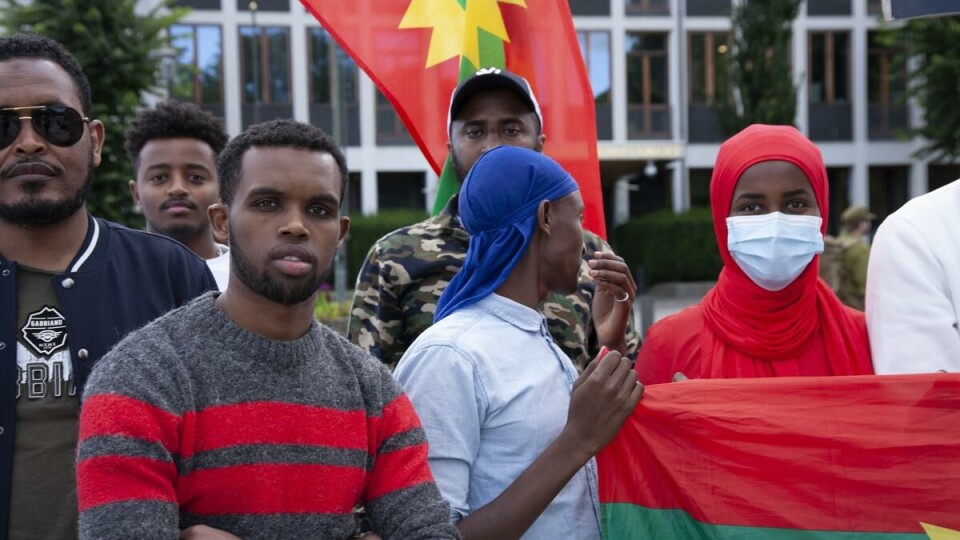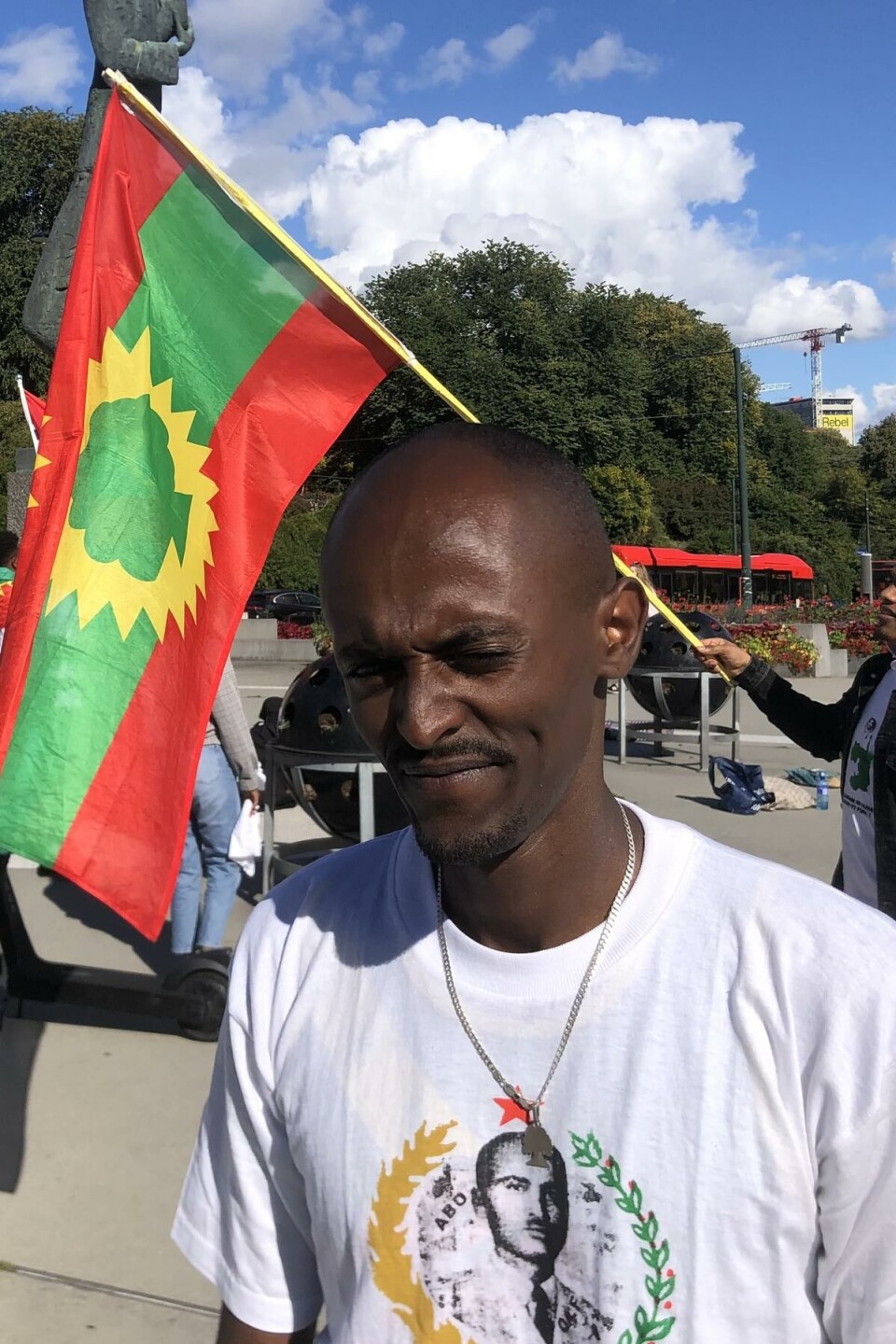
Hunger strike against human rights violations in their home country
Last year, the Prime Minister of Ethiopia, Abiy Ahmed, won the Nobel Peace Prize. Now, young Norwegian-Ethiopians are on hunger strike and are accusing him of human rights violations.
— We are doing this because of all the human rights violations in our home country, said Firaol Muktar Osman (31).
Osman, who studies economics, was one of more than 100 protestors who met outside the Norwegian Parliament (Stortinget) in protest against the regime in Ethiopia. It was Oromo Youth Association and The Oromo Union in Oslo who arranged the protest.
Before the demonstration, Osman had been on hunger strike since some days together with other young Norwegian-Ethiopians in the Norwegian-Oromo Youth Movement.
With slogans such as 'Ethiopia’s Prime Minister is a dictator!' and 'We want free elections!', the protestors marched from Parliament to the Ministry of Foreign Affairs (UD) to make a statement and to hand over a list of demands to UD.
— Among other things, we want formal condemnation of the suppression and imprisonment of the opposition, ensure that all Norwegians who are in Ethiopia are safe, and to encourage democratic and fair elections, said Osman.
One-sided media coverage
Osman is part of the Oromo people, who are the largest ethnic group in Ethiopia. Despite this, the Oromo people have a long history of being oppressed. According to Amnesty, Ethiopian authorities have for a long time used extreme violence, torture, and political persecution to suppress any form of criticism or suspected resistance. The Oromo people have been especially affected by this.
— We want a federal system where all ethnic groups have equal rights. We also want our language to become a federal language, like the Amharic language, said Osman.
He expresses concerns about Oromos who are imprisoned at protests that are shut down. When the Oromo musician and activist Haacaaluu Hundeessaa was shot and killed in June, several Oromo news agencies were shut down, journalists imprisoned, and the internet turned off in the entire country. In the wake of the murder, protests arose where 500 people lost their lives.
— Almost only the state-owned medias are allowed to operate, so all information that comes out of the country is controlled and manipulated, said Osman.
Lovise Aalen, researcher at the Chr. Michelsen Institute, supports Osman’s statement. She says that Oromo Median Network (OMN) was a very important voice for the interests of the Oromo people. They were allowed to re-open in 2018 under Abiy Ahmed, but during this summer’s demonstration several Oromo activists were arrested, and among them were the leader of OMN.
— This led to OMN being shut down, so now there are mostly just state-owned channels who are operating. Their coverage of the issue is very one-sided, she said.
Many of the problems the Oromo people have experienced, have not been taken care of by Ahmed
Lovise Aalen, researcher at the Chr. Michelsen Institute
A new hope?
In 2018, the now 44 year-old Abiy Ahmed took over as Prime Minister of Ethiopia. He promised great reforms and changes and quickly completed a peace treaty between Ethiopia and Eritrea. The latter resulted in a Nobel Peace Prize last year.
When he took over the power in Ethiopia as the leader of the Oromo Democratic Party (ODP), the long suppressed ethnic group, the Oromo people, had great expectations to the changes that were supposed to follow. But for many Oromos, the disappointment has been great.
— Many of the problems the Oromo people have experienced, have not been taken care of by Ahmed. Consequently, many Oromos, who had thought the situation would improve, are now feeling greatly disappointed, said Aalen.
She went on to talking about how Ahmed’s creation of a new party, The Prosperity Party, has pushed the Oromo people further away.
— He has moved away from the demands of the Oromos about focusing on ethnic representation, and instead wants to promote the Ethiopian identity.
This analysis is supported by Firaol Muktar Osman.

— On the outside, there are many nice words, but on the inside he is ruling with an iron fist, said Muktar Osman.
— Recently, he also went visited and took photos in a military camp where there are child soldiers. We don’t think it’s okay how he’s acting.
— Abiy Ahmed has also surely completed some things, he released political prisoners shortly after being elected?
— Many of those people have been thrown in prison again. For example, there was a women’s demonstration not that long ago, and many of the women were arrested and imprisoned.
There are almost only state-owned medias who are allowed to operate, so all information that comes out of the country is controlled and manipulated
Firaol Muktar Osman, student
Demands action from UD
The protestors presented demands to UD where they, among other things, demand a formal condemnation of the imprisonment of the opposition.
— Do you think UD will comply with the demands?
— Yes, that we believe. In the US, there have been great movements for the same, which has resulted in the US terminating certain transfers to the country.
In response to questions from Universitas, the Ministry of Foreign Affairs wrote over e-mail that they are familiar with The Oromo Union in Oslo, networks of Oromo organisations and other supporters’ concerns about the situation in Ethiopia as well as the appeal to Norwegian authorities.
We are following up on this through established channels and will also invite representatives from the Oromo groups to a meeting at the Ministry of Foreign Affairs, wrote Merete Dyrud, senior advisor in the section for the Horn of Africa and West Africa in the Ministry of Foreign Affairs.


































